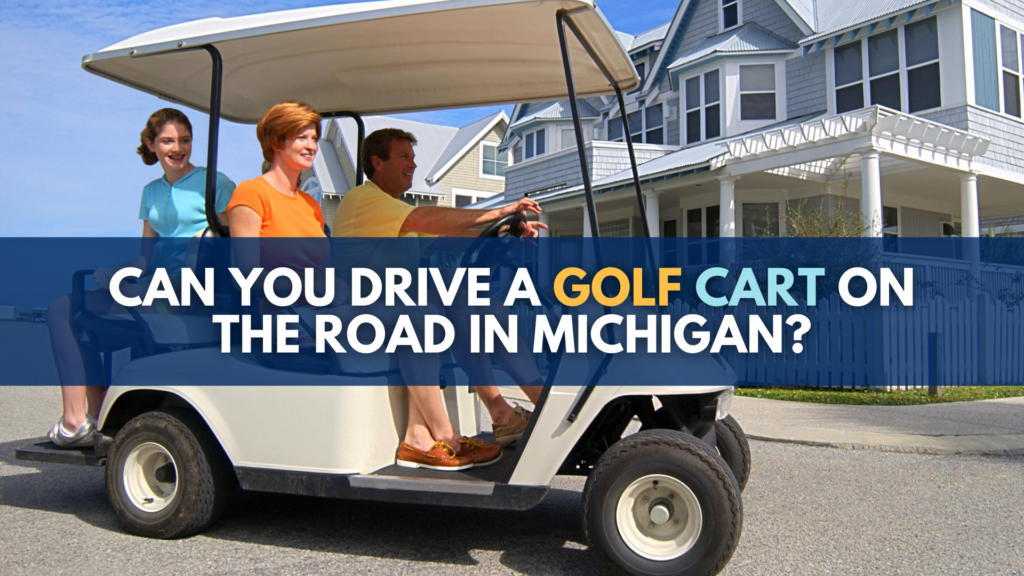Whether you can drive a golf cart on the road will depend on: (1) where the road is located; (2) what type of road it is; (3) how fast you’re planning to drive; (4) your age; (5) whether you have a valid driver’s license; and (6) whether the state you are in requires insurance for your golf cart.
When you have been injured in an accident with a car or truck while driving a golf cart on the road in Michigan, an experienced car accident lawyer can help you. People injured in golf cart accidents can still recover No-Fault insurance benefits and, depending on the answers to the questions above, may also be entitled to pain and suffering compensation for their injuries if the cart was struck by a car.
To learn more about a possible settlement of your cart accident case and what your injuries may be worth, check out our Settlement Calculator.
Can you drive a golf cart on the road in Michigan?
You can drive a golf cart on the road in Michigan in small communities that have allowed them. You can’t drive them on roads with a speed limit over 30 mph and can’t be driven at more than 15 mph. Drivers must be at least 16 years of age and have a driver’s license. No auto insurance is required to operate one.
However, the small villages, cities and townships that allow golf carts to be driven on their roads can legally still require that the carts and their drivers be “recorded on a list.” They can also require these carts to have certain safety equipment.
A “golf cart” is defined as “a vehicle designed for transportation while playing the game of golf.” (MCL 257.657a(21))
To learn more, check out my video about driving golf carts on the road in Michigan:
Pain and suffering compensation after an accident while driving a golf cart on the road
If you were injured by a car or truck while driving a golf cart on the road, you may be able to recover pain and suffering compensation from the at-fault driver who hit and the owner of the vehicle – if they are not the same person. You may also be able to recover excess medical expenses and excess lost wages.
Under Michigan law, you will need to be able to prove that you suffered a “serious impairment of body function” in order to recover pain and suffering compensation. This is known as the tort threshold injury requirement, which the No-Fault auto insurance law requires all injured pedestrians to comply with before they can successfully recover “noneconomic loss” damages.
Proof of a “serious impairment of body function” is not required to recover excess medical expenses and lost wages.
Compensation when you have been injured in an accident while driving a golf cart on the road
Your compensation will be greatly affected by how much liability insurance coverage the at-fault driver (and owner of his or her vehicle) has available. All Michigan drivers must have $250,000/$500,000 in liability insurance coverage. But they can “purchase lower limits” of $50,000 and $100,000. (MCL 500.3101(1); 500.3131(2); 500.3009(1)(a) and (b), (5))
The liability insurance coverage limits may be higher if the at-fault driver was driving for Uber or Lyft, driving a truck or commercial vehicle, and/or if he or she was an employee of a business and acting within the scope of his or her employment at the time of the accident.
No-Fault benefits after an accident while driving a golf cart on the road
You may be able to recover No-Fault benefits from the responsible auto insurance company after you have been injured by a car or truck while driving one on the street in Michigan. These benefits will help pay for medical expenses, lost wages, medical mileage and transportation costs and household replacement services.
No-Fault benefits are provided “without regard to fault” so it does not matter if you were at-fault in causing and/or contributing to the accident. (MCL 500.3105(2))
Paying for No-Fault benefits after an accident while driving a golf cart on the road
The way your auto insurance company will pay your No-Fault benefits after an accident will be one of the following: (1) the insurance company that insures your own car or truck; (2) the insurer for your spouse’s or a resident relative’s vehicle; or (3) the Michigan Assigned Claims Plan. (MCL 500.3114(1); 500.3115)
Can you drive a golf cart on the road in Michigan without No-Fault car insurance?
You can in Michigan without No-Fault car insurance because they are not considered a “motor vehicle.” Under Michigan’s No-Fault law, auto insurance is only required if you are operating a “motor vehicle.” The law excludes these carts from that definition. (MCL 500.3101(3)(i)(v))
Can you drive a golf cart on the road in Michigan without registration?
You can drive a golf cart on the road in Michigan without registering the cart with the Secretary of State – at least not for purposes of the requirements of Michigan’s No-Fault auto insurance law. (MCL 257.657a(20))
The law states that: “A golf cart operated on a street of a village, city, or township under this section is not required to be registered under this act for purposes of section 3101 of the insurance code of 1956, 1956 PA 218, MCL 500.3101.”
What is the Michigan golf cart law?
The Michigan golf cart law explains that these carts are allowed only in some small communities and on certain roads with posted speed limits under 35 mph. They cannot go more than 15 mph and must be driven by licensed drivers.
Here are the Michigan golf cart laws in more detail:
- Villages, cities and townships with less than 30,000 residents may by resolution allow the operation of these carts on the streets of that village, city or township. (MCL 257.657a(1))
- If a village, city or township allows them to be driven on its streets, then the village, city or township “may require those carts and the operators of those carts to be recorded on a list maintained by that village, city, or township.” (MCL 257.657a(2))
- A person shall not operate one on any street unless he or she is at least 16 years old and is licensed to operate a motor vehicle. (MCL 257.657a(5))
- The operator shall comply with the signal requirements of section 648 that apply to the operation of a vehicle. (MCL 257.657a(6)) If they are not equipped with electric turn signals and brake lights, then right and left turns as well as decreases in speed and full stops must be signaled by the driver using his or her left hand and arm. (MCL 257.648(2) and (3))
- Generally, a person is prohibited from driving them on a state trunk line highway, except to brief cross it while driving the operating one on a street of a village, city, or township. (MCL 257.657a(8)) Although the Michigan Department of Transportation may allow them to be driven on state trunk line highways under certain, limited conditions, they are never permitted to drive on a state trunk line highway that is also “an interstate highway.” (MCL 257.657a(9) and (10))
- If “a usable and designated path for golf carts is provided adjacent to a highway or street,” then golf carts can be required to be driven on the “path for golf carts” instead of the road. (MCL 257.657a(12))
- They are prohibited from “pass[ing] between lines of traffic” or lane-splitting. (MCL 257.657a(13))
- They cannot be driven at a speed that exceeds 15 mph. (MCL 257.657a(15))
- They cannot be driven on “a state trunk line highway or a highway or street with a speed limit of more than 30 miles per hour except to cross that state trunk line highway or highway or street.” (MCL 257.657a(15))
- They cannot be driven at night, i.e., “from 1/2 hour before sunset to 1/2 hour after sunrise.” (MCL 257.657a(16))
Can you drive a golf cart on the road in Michigan even if it does not have safety equipment?
The Michigan golf cart laws do not require that they carry any specific safety equipment. But the communities that permit them on their roads are empowered to impose the “vehicle safety requirements” that normally only apply to low-speed vehicles. (MCL 257.657a(21)(a-k))
The safety equipment that communities may require these carts to maintain include:
- Headlamps
- Tail lamps
- Stop lamps
- Turn signals
- Red reflectors on the sides and rear of the cart
- Mirrors (exterior and interior)
- Brakes
- Horn
- Windshield
- Safety belts
- Crash helmets
What is the Michigan slow moving vehicle law?
Michigan law provides that a slow-moving vehicle shall not be driven at more than 20 mph. (MCL 257.703) The law suggests that a “slow-moving vehicle” is an “implement of husbandry” which is “a vehicle or trailer” used for “agricultural, horticultural, or livestock operations.” (MCL 257.684a(2)(a); 257.21)
Injured in a golf car accident in Michigan? Call our attorneys now!
If you were injured in a golf cart accident in Michigan, call now (248) 353-7575 for a free consultation with one of our experienced car accident lawyers. There is no cost or obligation. You can also visit our contact page or use the chat feature on our website.
Our law firm is state’s largest and most successful law firm that specializes exclusively in helping people who have been injured in auto accidents.
Our secret? Our attorneys deliberately handle fewer cases than other personal injury law firms. This allows us to focus more time and attention on our cases.
Unlike other law firms, our auto accident attorneys are never too busy to promptly return phone calls and answer questions.
We have more than 1,900 5-Star reviews that reflect this care and attention to detail.
More importantly, this client-focused approach leads to better and faster settlements for our clients. Michigan Auto Law has recovered more million-dollar settlements and trial verdicts for motor vehicle accidents than any other lawyer or law firm in Michigan. We’ve also recovered the highest ever reported truck accident and car accident settlement in the state.
Call now so we can start making a real difference for you.




